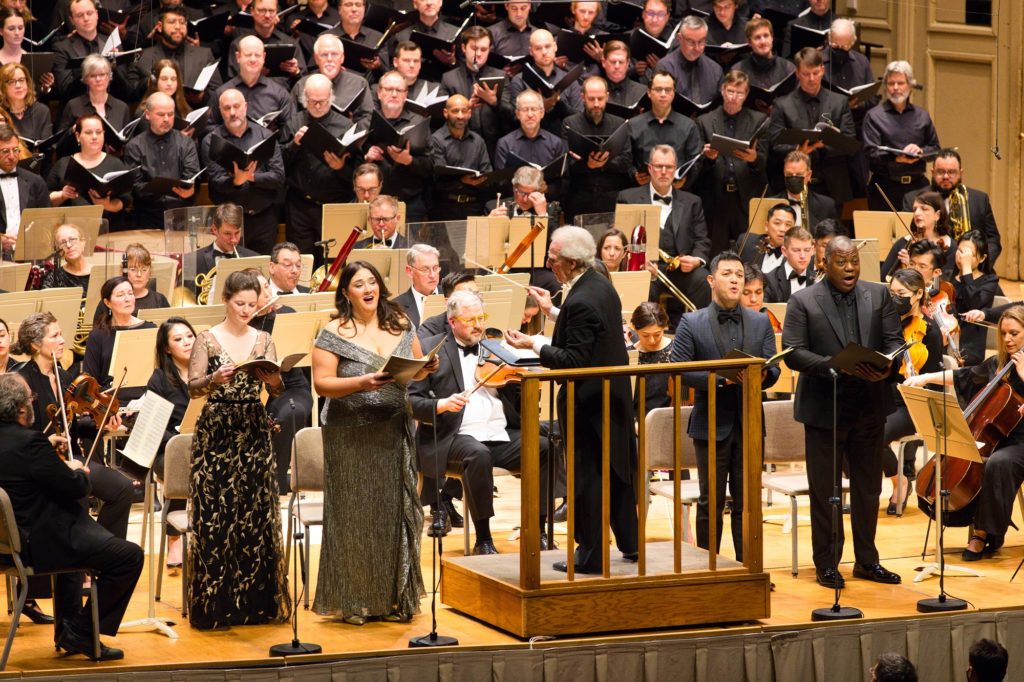A comforting yet audacious Beethoven Ninth from Zander, Boston Phil

Benjamin Zander led soloists and the Boston Philharmonic Orchestra in Beethoven’s Symphony No. 9 Friday night at Symphony Hall. Photo: Hilary Scott
After nearly two centuries, Ludwig van Beethoven’s Symphony No. 9 remains one of the repertoire’s bona-fide crowd pleasers. The “Choral” symphony is also one of the canon’s most idiosyncratic entries. Yet, in performance, the latter attribute can easily be sacrificed on the altar of familiarity.
Not so with Friday night’s traversal of this chestnut by the Boston Philharmonic Orchestra at Symphony Hall. While it’s true there is no single right way to make this sprawling work cohere, BPO music director Benjamin Zander’s latest take on it managed a near-ideal balance between musical comfort and aesthetic daring.
At the heart of the conductor’s approach was a focus on “tempo rubato”—a flexible handling of phrasing, especially in transitional sections. On Friday, this turned out to be a subtle thing, but one that resulted in a natural elasticity of the line. Taken together with the evening’s overall lively tempos, the music’s sheer structural novelty couldn’t help but emerge with inviting fervor.
Yet Zander’s attention to the music’s smaller details never came at the expense of the score’s larger picture. The opening Allegro, for instance, seethed with rhythmic turbulence and rich instrumental colors. Climaxes were huge but never wanted for textural clarity. Above all, the movement’s play of fragmented motives, rhythmic dissociation, and pounding fury came out bracingly, lending the reading a certain rhetorical theatricality.
So, too, the second movement’s marriage of strict, dancing counterpoint and folksiness. Here, the Scherzo’s limber, warm-toned outer thirds were countered by a Trio that was at once blistering and quicksilver. Andrew Price’s oboe solos in the latter—lithe, bright, fresh—were the picture of improvisational style.
The Adagio unfolded with a fluency and rightness all its own. The slow movement puts paid to the view that Beethoven was no tunesmith—instead, this is pure melody spun out over a quarter-hour.
On Friday, that time unwound with unfailing warmth and not a hint of sentimentality. What’s more, Zander wasn’t once sidetracked by the flowing string filigree in the middle variations; rather, the woodwinds’ mellifluous lines consistently sat front-and-center.
Singing—the real kind—takes center stage in the finale. If sometimes the Ninth’s last movement can come across as the most outlandish in the canon, on Friday its originality carried the day.
Part of this was due to the BPO’s charismatic playing. In particular, the low strings’ delivery of the opening recitative was marked by a beguiling liveliness. Additionally, the introduction of the “Ode to Joy” theme packed a palpable sense of anticipation and excitement.
The night’s vocalists also did their part. The solo quartet—soprano Liv Redpath, mezzo-soprano Ashley Dixon, tenor Nicholas Phan, and baritone Alfred Walker—delivered their lines with nobility and excellent blend.
Likewise robust were the contributions of Chorus Pro Musica and Boston University’s Marsh Chapel Choir. Together, the combined choruses weren’t once daunted by the movement’s treacherous, high-lying sequences and they made stirring work of the “Ode to Joy” refrains.
However, it was the night’s cumulative effort—the uncommon ease and spontaneity of the unfolding musical argument, the seamless shifts between wildly disparate musics, an exceedingly fresh give and take between voices and instruments—that raised this performance far above the commonplace.
In the Ninth, Beethoven etched a vision of “all men” (in Friedrich Schiller’s phrase) joining together as brothers. Zander & Co. realized as much last night. Now it’s up to the rest of us to do the same.
The program will be repeated 3 p.m. Sunday at Carnegie Hall. carnegiehall.org
Posted in Performances